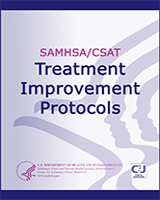NCBI Bookshelf. A service of the National Library of Medicine, National Institutes of Health.
Center for Substance Abuse Treatment. Substance Abuse: Clinical Issues in Intensive Outpatient Treatment. Rockville (MD): Substance Abuse and Mental Health Services Administration (US); 2006. (Treatment Improvement Protocol (TIP) Series, No. 47.)

Substance Abuse: Clinical Issues in Intensive Outpatient Treatment.
Show detailsTreatment Improvement Protocols (TIPs), developed by the Center for Substance Abuse Treatment (CSAT), part of the Substance Abuse and Mental Health Services Administration, within the U.S. Department of Health and Human Services, are best-practice guidelines for the treatment of substance use disorders. CSAT draws on the experience and knowledge of clinical, research, and administrative experts to produce the TIPs, which are distributed to facilities and individuals across the country. The audience for the TIPs is expanding beyond public and private treatment facilities to include practitioners in mental health, criminal justice, primary care, and other health care and social service settings.
CSAT's Knowledge Application Program expert panel, a distinguished group of experts on substance use disorders and professionals in such related fields as primary care, mental health, and social services, works with the State Alcohol and Drug Abuse Directors to generate topics for the TIPs. Topics are based on the field's current needs for information and guidance.
After selecting a topic, CSAT invites staff from pertinent Federal agencies and national organizations to be members of a resource panel that recommends specific areas of focus as well as resources that should be considered in developing the content for the TIP. These recommendations are communicated to a consensus panel composed of experts on the topic who have been nominated by their peers. Consensus panel members participate in a series of discussions. The information and recommendations on which they reach consensus form the foundation of the TIP. The members of each consensus panel represent substance abuse treatment programs, hospitals, community health centers, counseling programs, criminal justice and child welfare agencies, and private practitioners. A panel chair (or co-chairs) ensures that the contents of the TIP mirror the results of the group's collaboration.
A large and diverse group of experts closely reviews the draft document. Once the changes recommended by these field reviewers have been incorporated, the TIP is prepared for publication, in print and on line. TIPs can be accessed via the Internet at www.kap.samhsa.gov. The online TIPs are consistently updated and provide the field with state-of-the-art information.
Although each TIP strives to include an evidence base for the practices it recommends, CSAT recognizes that the field of substance abuse treatment is evolving, and research frequently lags behind the innovations pioneered in the field. A major goal of each TIP is to convey “front-line” information quickly but responsibly. For this reason, recommendations proffered in the TIP are attributed to either panelists' clinical experience or the literature. If research supports a particular approach, citations are provided.
This TIP, Substance Abuse: Clinical Issues in Intensive Outpatient Treatment, was written to help clinicians address the expansion of intensive outpatient treatment (IOT) represented by the development and adoption of new approaches to treat a wider variety of clients. Researchers and clinicians have begun to question the acute care model of treatment for substance use disorders; this reexamination has led to a more robust collaboration between researchers and practitioners. The resulting focus on evidence-based treatment approaches informs most of the material in this TIP. The consensus panel presents 14 guiding principles of IOT, supported by research and clinical experience. This TIP also situates IOT within the continuum of care framework established by the American Society of Addiction Medicine, including outpatient treatment and continuing community care. The volume describes the core services every program should offer, the enhanced services that should be available on site or through links with community-based services, and the process of assessment, placement, and treatment planning that helps clinicians address each client's needs. Based on research and clinical experience, the consensus panel discusses major clinical challenges of IOT and surveys the most common treatment approaches used in IOT programs, including family-based services. More specialized sections address treatment of specific groups of clients: women; adolescents and young adults; persons involved with the criminal justice system; individuals with co-occurring disorders; racial and ethnic minorities; persons with HIV/AIDS; lesbian, gay, and bisexual individuals; persons with physical or cognitive disabilities; rural populations; individuals who are homeless; and older adults.
- What Is a TIP? - Substance Abuse: Clinical Issues in Intensive Outpatient Treatm...What Is a TIP? - Substance Abuse: Clinical Issues in Intensive Outpatient Treatment
- Chapter 6. Family-Based Services - Substance Abuse: Clinical Issues in Intensive...Chapter 6. Family-Based Services - Substance Abuse: Clinical Issues in Intensive Outpatient Treatment
- Chapter 6 - Quality Assurance Guidelines - Improving Treatment for Drug-Exposed ...Chapter 6 - Quality Assurance Guidelines - Improving Treatment for Drug-Exposed Infants
- Appendix H - Federal Resource Panel - Improving Treatment for Drug-Exposed Infan...Appendix H - Federal Resource Panel - Improving Treatment for Drug-Exposed Infants
Your browsing activity is empty.
Activity recording is turned off.
See more...